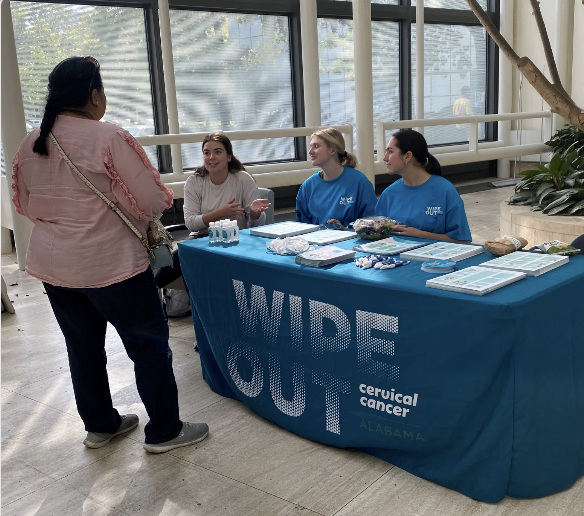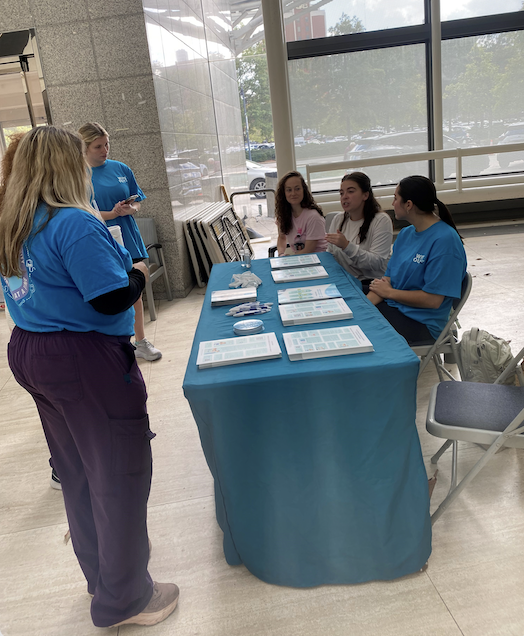 In an inspiring effort to eliminate cervical cancer as a public health problem, University of Alabama at Birmingham Peer Wellness Ambassadors (PWAs) and medical students in the Obstetrics and Gynecology Student-Run Interest Group at UAB Heersink School of Medicine have launched OPERATION WIPE OUT UAB. These students lead initiatives to raise cervical cancer awareness, promote HPV vaccination and screening among UAB students, and empower them to advocate for their own health and the well-being of others. With passion and creativity, these students are actively working to create change and a true movement that will be expanded to the entire UAB community.
In an inspiring effort to eliminate cervical cancer as a public health problem, University of Alabama at Birmingham Peer Wellness Ambassadors (PWAs) and medical students in the Obstetrics and Gynecology Student-Run Interest Group at UAB Heersink School of Medicine have launched OPERATION WIPE OUT UAB. These students lead initiatives to raise cervical cancer awareness, promote HPV vaccination and screening among UAB students, and empower them to advocate for their own health and the well-being of others. With passion and creativity, these students are actively working to create change and a true movement that will be expanded to the entire UAB community.
“Being able to be at the forefront of an effort that can have such an impact in our community makes me feel empowered to inspire others,” said Meghna Penumudi, UAB freshman biology major and Peer Wellness Ambassador.
OPERATION WIPE OUT is a statewide plan to eliminate cervical cancer as a public health problem in Alabama. It was launched by Dr. Scott Harris, Alabama State Health Officer, in 2023 as a collaboration effort of many partners across the state, including the UAB, Alabama Department of Public Health, Rotary Club of Birmingham, and others. Alabama is the first and only state in the United States with such a plan. It is based on three pillars: HPV vaccination, cervical cancer screening, and adherence to follow-up and treatment in the event of abnormal results.
“With UAB being one of the leaders in OPERATION WIPE OUT and seeing the amazing impact of this effort across our state and beyond, it represented an opportunity for UAB to be a model for our colleges and universities across the nation”, said Isabel Scarinci, Ph.D., MPH, vice-chair for Global and Rural Health at UAB Department of Obstetrics and Gynecology.
Two medical students, Nina Orihuela and Sellers Swann, immediately accepted the challenge and put together an evidence- based plan for UAB, beginning with students and with opportunities to expand to staff, faculty, and the entire UAB community.
based plan for UAB, beginning with students and with opportunities to expand to staff, faculty, and the entire UAB community.
“It was not unexpected to find in the literature that the two most influential factors in increasing HPV vaccination and screening practices are receiving recommendations from a healthcare provider or a loved one. It has been one of the most fulfilling experiences to witness the UAB community embrace this initiative and become proactive health advocates,” said Nina Orihuela, second-year medical student and the student-outreach coordinator for the UAB OB/GYN Student Interest Group.
The program has seen an outpouring of enthusiasm as students engage in various activities like organizing tabling events, distributing informational materials, and hosting awareness campaigns. Their innovative approach sets these students apart—they use social media platforms to spread vital information, create eye-catching infographics, and even incorporate interactive digital tools to better reach their peers.
“When we first came together, I was bursting with ideas for advertisement, social marketing, and general outreach to the undergraduate community. I want to help my peers reach for their greatest potential and spread awareness on how to maintain their health and well-being. Seeing others be so touched and appreciative of OPERATION WIPE OUT’s efforts while I have worked with them has been nothing short of rewarding,” said Akenna Mcmillian, UAB undergraduate student and Peer Wellness Ambassador.
 Through collaboration with health professionals, students are educating their peers on the importance of vaccinations and regular screenings, encouraging them to take proactive steps toward their health and being champions in spreading the key messages.
Through collaboration with health professionals, students are educating their peers on the importance of vaccinations and regular screenings, encouraging them to take proactive steps toward their health and being champions in spreading the key messages.
“The partnership with the UAB Student Health Services has been phenomenal and a testament of their commitment to our students. They have not only provided open slots for students to obtain the HPV vaccine, but also joined the PWAs and medical students in tabling events bringing vaccination to the students,” said Scarinci.
Although the primary focus is on cervical cancer, there are five other cancers associated with the HPV infection affecting both men and women, such as vulvar, vaginal, penile, oropharyngeal, and anal cancer. By combining knowledge, creativity, and a shared sense of responsibility, these students are taking bold steps toward a future free of cervical cancer, proving that even small actions can lead to significant change.
Upcoming Operation Wipe Out meeting and orientation
The first official orientation for anyone interested in joining the group will be held on Tues., September 2, 2025, from 6 p.m. to 8 p.m., in Hill Student Center Room 203. The group will be joined by the faculty advisor, Dr. Scarinci, vice chair for Global and Rural Health at the UAB Department of OB/GYN, and Dr. Ketch, Gynecologic Oncology fellow at the UAB Heersink School of Medicine. They will share the mission and goals behind OPERATION WIPE OUT and provide more information about cervical cancer. This is also an excellent opportunity to network and meet others who are passionate about public health and advocacy for eliminating cervical cancer.